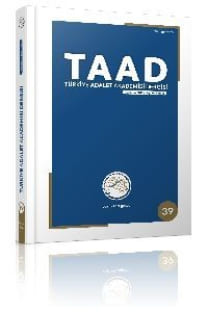ABD hukukunda mahkeme kararları ışığında hükümlü, tutuklu, şartla salıverme ve adli kontrole tabi kişilerle ilgili aramalar
ABD Hukukunda, kişilere yönelik arama, elkoyma ve yakalama işlemlerine karşı güvenceler sağlayan düzenleme, Anayasasının Ek 4. Maddesidir. Bu madde görevlilerce bu işlemlerin makul olarak yürütülmesini; yapılacak işlemler için hakimden karar alınmasını, alınacak kararın ise hem bir makul sebebe dayanmasını, hem de yapılacak işlemlerin kapsamını belirginleştirmesini öngörmektedir. Ek 4. Madde bir taraftan karar zorunluluğu aramakla birlikte bunun Yüksek Mahkemekararları ile şekillenen bazı istisnaları vardır. Adli kontrole tabi kişiler ile şartlı salıvermeden yararlananların aranması da bu karar zorunluluğunun istisnasını oluşturur. Bu kişilerle ilgili aramaların hakim kararı olmadan yapılabileceğine dair kararlar vardır. Rutin aramalar bakımından bir şüphe nedenine dayanmak gerekmez. Ancak rutini aşan aramalar makul şüpheye dayanarak yapılabilir.
An analysis on searches regarding prisoners, parolee and probationer in the United states in consideration of judicial precedent
The U.S. Constitution includes many fundamental guarantees of individual liberty, including the right to be free from unreasonable searches and seizures. According to The Fourth Amendment all searches and seizures must be reasonable and be supported by probable cause in order for them to be conducted. The Fourth Amendment protects the people against unreasonable searches and seizures by requiring warrant based on probable cause. This Amendment provides a general standard that all searches and seizures must be reasonable. It also imposes obtaining warrant, relying on probable cause, andbe seized. describing particularly the place to besearched, and the persons or things to The Supreme Court has interpreted the Fourth Amendment to include a presumptive warrant requirement. The Supreme Court, however, has also recognized situations that render obtaining a warrant impractical or against the public's interest and has accordingly crafted various exceptions to the warrant and probable cause requirements of the Fourth Amendment. Searches which have been established by the Supreme Court regarding parolee and probation are exceptions to the warrant requirement, not requiring a search warrant, probable cause, reasonable suspicion, or even an articulable suspicion.
___
- Andrew E. Taslitz-Margaret L. Paris-Lenese C. Herbert: Constitutional Criminal Procedure, Professor Review Copy Not For Sale, Foundation Press, Third Ed. 2007 Ed.
- Bernard E. Harcourt: “The Road to Racial Profiling” In: Carol S. STEIKER, Criminal Procedure Stories, 2006.
- Brent E. Newton: Practical Criminal Procedure, A Constitutional Manual, NITA, 2005.
- Clifford S. Fishman- Anne T. Mckenna: Wiretapping § Eavesdropping: Surveillance In The Internet Age, Third Edition, 2007, Online Westlaw.
- Erwin Chemerinsky-Laurie L. Levenson: Criminal Procedure, Investigation, Aspen Publishers, 2008. (CHEMERINSKY-LEVENSON)
- Federal Procedure: Lawyers Edition, § 22:223, Database updated March 2010, Online West Law.
- James F. Anderson- Bankole Thompson: American Criminal Procedure, 2007.
- James F. Anderson-Laronistine Dyson: Legal Rights of Prisoners, Cases and Comments, University Press of America, 2001.
- Jerold H. Israel-Wayne R. Lafave: Criminal Procedure, Constitutional Limitations, 6th Ed. 2001.
- John R. Kennel-Jane E. Lehman: “Searches and Seizures”, American Jurisprudence, Second Edition, 68 Amr. Jur. 2d. Searches and Seizures, § 54, Database updated May 2009, Online Westlaw.
- John R. Kennel-Jane E. Lehman: “Searches and Seizures”, 68 Amr. Jur. 2d. § 131, Online Westlaw.
- Joshua Dressler-Alan C. Michaels: Understanding Criminal Procedure, Volume 1: Investigation, 4th Edition, 2006, Lexis Nexis.
- Marc L. Miller-Ronald F. Wright: Criminal Procedures, The Police, Aspen Publishers, Third Ed. 2007.
- Micheal A. Cretacci: Supreme Court Case Briefs in Criminal Procedure, 2008.
- Otis H. Stephens- Richard A. Glenn: Unreasonable Searches and Seizures, Rights and Liberties Under the Law, 2006.
- Robert M. Bloom - Mark S. Brodin: Criminal Procedure, Aspen Publishers, Fourth Edition, 2004.
- Ronald J. Allen-Joseph L. Hoffmann-Debra A. Livingston-William J. Stuntz: Criminal Procedure: Investigation and Right to Counsel, Aspen Publishers, 2005.
- Russel L. Weaver- Leslie W. Abramson- John M. Burkoff- Catherine Hancock: Principles of Criminal Procedure, Third Edition, Thomson-West, 2008.
- Steven L. Emanuel: Criminal Procedure, Aspen Publishers. 27th Edition, 2007. (EMANUEL)
- Stephen A. Saltzburg - Daniel J. Capra - Angela J. Davis: Basic Criminal Procedure, 4th Edition, Thomson-West 2005.
- Thomas N. McInnis: The Evolution of the Fourt Amendment, 2009.
- Wayne R. Lafave - Jerold H. Israel - Nancy J. King: Criminal Procedure and The Constitution, 2009.
- Wayne R. Lafave: Search and Seizure, A Treatise on the Fourt Amendment, Volume 5, Fourth Edition, Thomson-West 2004.
- Wayne R. Lafave - Jerold H. Israel - Nancy J. King: Criminal Procedure, Fourth Edition, 2004, Thomson-West,
- ISSN: 1309-6826
- Başlangıç: 2010
- Yayıncı: Türkiye Adalet Akademisi
Sayıdaki Diğer Makaleler
Demokatik hukuk devletlerinde yargının kurumsallaşması
Ekonomik esas doktrinine göre ABD vergi mahkemesi’nin stars işlemlerine bakışı
Ölüme bağlı tasarrufların yorumu
Alman öğreti ve uygulaması ışığında vazgeçmede gönüllülük unsuru
Türkiye’de telekomünikasyon yoluyla yapılan iletişimin önleme amaçlı denetlenmesi
Türk ceza yargısında soruşturma ve kovuşturma evresindeki mağdur hakları
